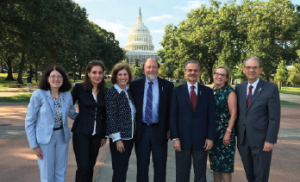
From left: ARHP President Elizabeth A. Schlenk, PhD, RN; ACR/Foundation Treasurer Paula Marchetta, MD, MBA; ACR President Joan M. Von Feldt, MD, MSEd; ACR/Foundation Secretary David I. Daikh, MD, PhD; ACR President-Elect Sharad Lakhanpal, MBBS, MD; Foundation Vice-President Abby G. Abelson, MD; and Foundation President Eric L. Matteson, MD, visited Washington, D.C., in September, where they met with members of Congress to inform them of issues of importance to ACR members.
Heraclitus of Ephesus (c. 500 BC) is credited with the saying, “The only constant is change.” Now, centuries later, change is meteoric, and especially in healthcare and health policy, the pace of change is relentless. Rheumatology and other specialties continue to face challenges that threaten the ability to deliver compassionate, competent care to patients. The Medicare Access and CHIP Reauthorization Act (MACRA), the Part B Drug Payment Demonstration Project, tiered reimbursement, biosimilars, prior authorization and other policy decisions may have large negative impacts on our practice. Policymakers at the national and state levels are making decisions that directly affect our treatment of patients with rheumatic disease.
How will rheumatologists have a voice in the changes that will occur? The answer lies in our own willingness to educate and advocate. Why? Because rheumatologists and rheumatology health professionals are uniquely positioned and qualified to inform policy makers about our own and our patients’ needs, and to educate policymakers about consequences, frequently unintended, that policies may have on our ability to deliver care and our patients’ ability to get care. With this in mind, let’s take a brief look at some of the major issues facing rheumatology and rheumatology practices, and what you can do.
MACRA
MACRA is an entirely new Medicare payment system. It was the result of repealing the flawed Sustainable Growth Rate (SGR) payment formula that called for ever-growing payment cuts to physicians. MACRA shifts reimbursement from fee-for-service to pay-for-performance and will have a greater impact on rheumatologists than the Affordable Care Act.
The MACRA initiative sunsets existing quality reporting and penalty programs and establishes a single new system, the Merit-Based Incentive Payment System (MIPS), as the default fee-for-service track that most rheumatologists will take. For those able to participate in an approved Alternative Payment Model (APM), significant bonuses will be available, as well as exemption from MIPS. Physicians who participate in the ACR’s RISE Registry will have an advantage. RISE usage is expected to generate credit in three of the four MIPS categories. In addition, physician users’ reporting is handled automatically with RISE. Most importantly, what physicians do in 2017, the first performance year, will determine penalties or bonuses coming from MACRA in 2019. The Centers for Medicare & Medicaid Services (CMS) recently announced it has heard the concerns of the ACR and other stakeholders and will give providers more flexibility with regard to MACRA requirements in 2017. Providers will be able to choose among four options within the first year and avoid penalties.